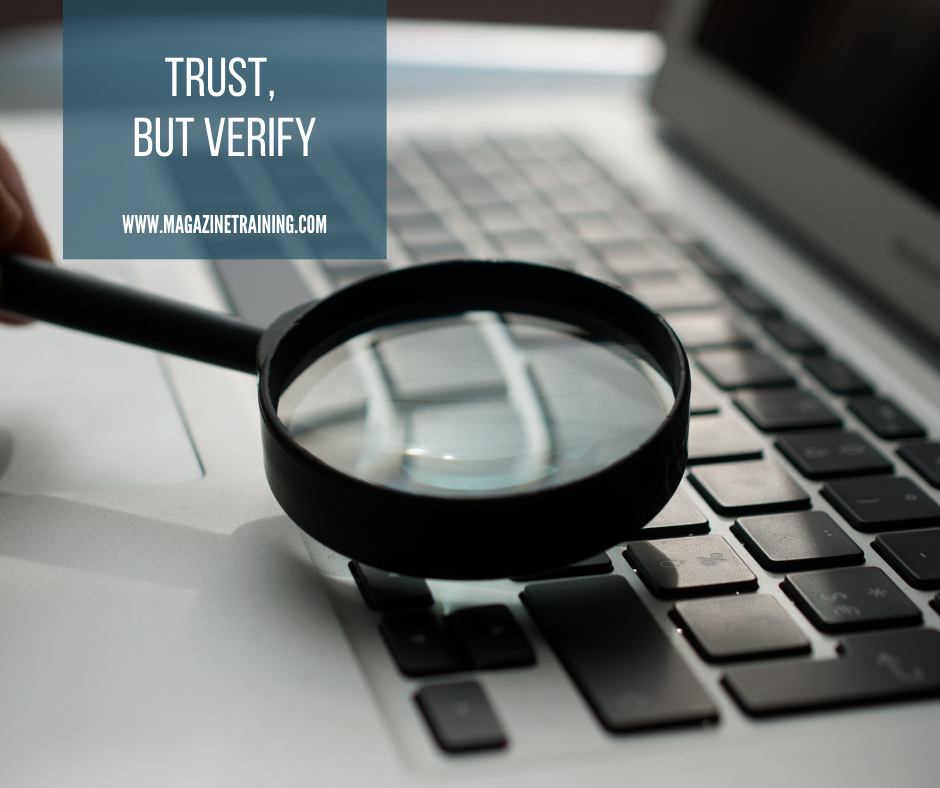
The headline caught my attention. A search for the publisher of a controversial pamphlet was underway. The pamphlet had an impact on a particular religious community: it convinced some parents not to vaccinate their children. Their decision became a public health concern when that community faced an outbreak of measles. I wondered if the publisher would face criminal charges, and if those might have been forestalled with a little fact-checking.
At the time I read the headline, I was ghost-writing devotionals based on a sermon. The preacher alluded to some scientific process, but he’d gotten the facts wrong. It was a minor error and easy to fix. The instructions and style guide I received from the commissioning editor did not include anything on fact-checking, but I had done it anyway.
Who is responsible?
Do you fact-check the material you receive? Or do you trust that the authors and preachers you work with get their facts right every time? How do you decide what and how much should be checked? How do you know what is “fake news” and what is a true fact? Even our language has changed to reflect our preoccupation with getting the story right.
Newsweek’s editorial guidelines place the responsibility for fact-checking squarely on the journalist’s shoulders: “You are responsible for the accuracy of your story. Check every single fact that you include: dates, spelling of names, titles, timelines, numbers, and other statistics. Hard-check any superlative—i.e., is this really the first, the worst, the only, the highest?” Other organizations present fact-checking as a shared task.
Why should we care?
In discussing a recent fact-checking scandal involving German magazine Der Spiegel, Southern Baptist leader Al Mohler concluded, “[We] all want to be told the stories we want to be told [but] the truth really matters. A story, of course, doesn’t have to be true to be interesting, but it does have to be true to be true. Christians underline and must affirm that the truth always matters. . . everywhere, anywhere, all the time.”
Fact-checking also matters because it affects our witness—as this column by a prominent atheist suggests. (A Christianity Today article comments on the research he cites here.)
How do you make sure that what you publish is true?
The Poynter Institute offers a number of resources on the topic, as does the Global Investigative Journalism Network here. The Society of Professional Journalists provides this list. There are many similar compilations on the web. There are even a few inspirational resources, such as MTI board member and trainer Dr. Michael Ray Smith’s book Fake News, Truth-Telling and Charles M. Sheldon’s Model of Accuracy: How a Clergyman Insisted on Accuracy as Job One.
I do not want to duplicate the lists, but I do want to offer my own tips for your consideration:
- Reflect on past mistakes. Pay attention to the critiques you have received and determine what types of errors you, or your authors, are most likely to make.
- Avoid repeating past mistakes. Develop clear guidelines for fact-checking and be sure they are communicated to all involved.
- Maintain a list of vetted resources you recommend your staff use. Review the list as needed.
- Trust that your fact-checking guidelines are followed, but verify this, too. There are a number of ways you might do this: asking authors to provide documentation for the facts they used, asking a third party who knows the subject to comment on a piece, performing random checks, or incorporating some fact-checking into your editing or proofreading processes. Make your double-checking system practical and easy to implement.
- Seek information and input from voices outside your usual circles. Do not let a single search engine’s algorithms determine all you see on the web.
- Aim for accuracy, but recognize that it is human to err. Seek improvement. Reward truth-telling in your organization, even when the truth is not pleasant or welcome.
Is it worth the effort?
I wish there were an easily measured return-on-investment figure you could attach to the task of fact-checking. Like so many other necessary and often invisible tasks, it is difficult to measure how fact-checking contributes to the bottom line. And unlike the case with the pamphlet I mentioned at the start of this article, the errors that slip past us usually don’t have life-or-death consequences. Most of the time, our errors are minor ones, and easily corrected.
No one likes to have someone else point out their mistakes. Fact-checking can be a thankless task! But when what we must do to faithfully serve God in our publications is tedious or troublesome, the Bible gives us wonderful encouragement: “Always give yourselves fully to the work of the Lord, because you know that your labor in the Lord is not in vain” (1 Corinthians 15:58). God sees our efforts—and he loves us, mistakes and all (Romans 5:8). And that is a fact we can rely on.
 Kim Pettit, chair, Board of Directors, Magazine Training International
Kim Pettit, chair, Board of Directors, Magazine Training International
Related posts
Magazine Training International’s mission is to encourage, strengthen, and provide training and resources to Christian magazine publishers as they seek to build the church and reach their societies for Christ.

